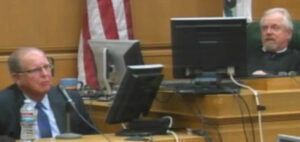
Credit: iStockphoto.com
A former superintendent of three school districts defended the current laws for granting teachers tenure, dismissing ineffective teachers and conducting layoffs based on seniority as the defense began in Vergara vs California, the lawsuit putting employment protections for teachers on trial.
Robert Fraisse, a 40-year educator who’s currently a Distinguished Educator in Residence at California Lutheran University, also criticized the use of standardized test scores to evaluate teachers, which he said would complicate efforts to recruit teachers to high-poverty schools and undermine collaboration among teachers, which he attributed to raising student achievement in districts he had led.
“I would predict schools would have trouble maintaining and recruiting a work force” if results of student test scores became the basis for determining who was hired after a probationary period and who was deemed to be effective, Fraisse said during his day-long testimony. “Teachers would not perceive that as fair and morale would be hurt.” The proceedings were streamed over the Internet by the Courtroom View Network.
Attorneys for the state and the state’s two teachers unions, the California Teachers Association and the California Federation of Teachers, will spend the remaining weeks of the trial undermining the case built on behalf of the plaintiffs, high school student Beatriz Vergara and eight other students, that laws on tenure, dismissal and layoffs by seniority protect the worst teachers. These teachers, plaintiffs’ witnesses said, are disproportionately assigned to poor, minority students and deny them an equal opportunity to a good education. Students Matter, a nonprofit created by Silicon Valley entrepreneur David Welch, filed the lawsuit on the students’ behalf.
Value of test data disputed
The use of standardized test scores is not on trial, per se. But the plaintiffs’ experts have used scores and a refined version of them tied to student demographics, called value-added metrics, to define the worst-performing teachers and document the harm they cause students they teach. Student test scores also could be a measure of teacher effectiveness as a basis for dismissing and laying off teachers, instead of by seniority alone.

Defense witness Robert Fraisse, left, and Superior Court Judge Rolf Treu listen to an attorney’s question during the trial on Wednesday. Credit: Photo from videostream courtesy of Courtroom View Network.
Fraisse was a high-ranking administrator or superintendent in three Southern California school districts over the past 20 years: 22,000-student Conejo Valley Unified, 9,000-student Hueneme Elementary School District and 11,500-student Virgenes Unified School District. While he was there, the districts didn’t use student test scores to evaluate teachers and to decide who should be hired as a permanent teacher following probation, Fraisse said. Test scores were used to identify schools that needed improvement and subgroups of students that needed more attention, he said.
Fraisse implied that measuring one teacher’s impact on a student’s test scores can’t be done accurately in a district with a culture of collaboration. At Hueneme Elementary School District, “the principle was that every student belonged to every teacher in school; there was mutual responsibility for success of all students, and all teachers owned all kids,” he told Jim Finberg, lead counsel for the California Teachers Association. Teachers switched off on one-to-one tutoring and student interventions; different teachers taught Saturday classes for students who were behind. (Plaintiffs’ attorney Marcellus McRae tried to get Fraisse to acknowledge that such a strategy might not be relevant to a huge district like Los Angeles Unified, but Judge Rolf Treu cut short that line of questioning.)

Nine students and their families have sued the state over teacher retention and dismissal laws, saying they protect bad teachers and violate students’ rights to a quality education. Credit: EdSource file photo
Witnesses for the plaintiffs, including Los Angeles Unified Superintendent John Deasy and former Sacramento City Unified Superintendent Jonathan Raymond, testified earlier in the trial that the probation period in California was too short, the dismissal process too complicated and expensive and the layoff process, unrelated to measures of effectiveness, detrimental to students.
Fraisse demurred.
On tenure, Fraisse said that in almost all cases, principals could accurately determine who should be given permanent status or tenure in the time required. California is one of only a few states that grant tenure after two years of teaching; in most states it is three to five years. To comply with notification requirements, tenure decisions must be made by March of the second year, less than two years. In “one or two cases” in which teachers “were on the bubble, we took a conservative approach. We would reluctantly have to terminate employment.”
On layoffs, Fraisse said that he had not seen a better, more objective system than seniority. “It is a fair method that is perceived as fair when tight economic times require tough things,” he said. (He also said he believed that substituting test scores as a measure of effectiveness might lead to a narrowing of the curriculum and a breakdown of collaboration, but after plaintiff’s attorney McRae objected, Judge Treu disallowed that answer as speculative.)
Voluntary resignations
On dismissals, Fraisse said that teachers in his districts who were found to be unsatisfactory, based on evaluations, were given specific improvement plans, and then, if they failed to make progress, were persuaded to quit or resigned on their own. The districts didn’t have to pursue firing through a Commission on Professional Competence, a three-person appeals board – an avenue that the plaintiffs argued can cost hundreds of thousands of dollars and can take years to resolve. Fraisse said that he was able to avoid conflicts over dismissal by working through a collaborative Peer Assistance and Review process that involved union participation. And he acknowledged that “small” financial settlements, such as a short-term payment of health benefits, helped seal the resignation deals, though the district made up the difference by hiring lower-paid long-term substitutes or new teachers at lower starting pay.
On cross-examination, McRae, representing the plaintiffs, pressed the former superintendent to admit that voluntary resignations don’t solve the problem of the worst performers, who then can apply for jobs in other districts with their teaching credentials intact. Fraisse said he didn’t know what happened to teachers after they left the district but admitted that the agreements they signed with the district were confidential.
Fraisse acknowledged that in both Conejo Unified and Laguna Beach Unified, the two more recent districts where he was superintendent, minority and low-income students – the focus of the Vergara case – made up a small percentage of students. McRae asked him to verify that African American and Latino students had significantly lower API scores in districts that he led, indicating there was a significant achievement gap. But Fraisse said he could not confirm the numbers from state data a decade or so ago. At this point, the API data for his districts haven’t been entered into the court record.
John Fensterwald covers education policy. Contact him and follow him on Twitter @jfenster. Sign up here for a no-cost online subscription to EdSource Today for reports from the largest education reporting team in California.
To get more reports like this one, click here to sign up for EdSource’s no-cost daily email on latest developments in education.















Comments (15)
Comments Policy
We welcome your comments. All comments are moderated for civility, relevance and other considerations. Click here for EdSource's Comments Policy.
CarolineSF 10 years ago10 years ago
Haven’t seen Linda Darling-Hammond’s testimony mentioned anywhere else.
http://dianeravitch.net/2014/03/22/linda-darling-hammond-testifies-in-vergara-trial/
Floyd Thursby 10 years ago10 years ago
PJ this is silly, teachers get far more days off than almost any other profession and still get 10 paid days or more they don't show up. In my view, if you work 180 days a year, for the most part, a diligent person most years shouldn't miss a single day. You get heads of unions (Ken Tray) making public statements it's OK to call in sick due to stress, or implying it … Read More
PJ this is silly, teachers get far more days off than almost any other profession and still get 10 paid days or more they don’t show up. In my view, if you work 180 days a year, for the most part, a diligent person most years shouldn’t miss a single day. You get heads of unions (Ken Tray) making public statements it’s OK to call in sick due to stress, or implying it saying he may call in sick because people disagree with him over a proposal on teacher housing (a good idea, but that’s besides the point, no excuse to call in sick).
PJ Sharp 10 years ago10 years ago
May I note to you that only in the teaching profession is there one and only one "hiring season" and that being released prevents the candidate from seeking another position until spring -- the school year preempts mid-year hiring. Teaching is also the only profession I know where salaried employees are paid only for the days they work and there are no paid holidays or vacations. I like the ideas of Paul Muench. I … Read More
May I note to you that only in the teaching profession is there one and only one “hiring season” and that being released prevents the candidate from seeking another position until spring — the school year preempts mid-year hiring. Teaching is also the only profession I know where salaried employees are paid only for the days they work and there are no paid holidays or vacations.
I like the ideas of Paul Muench. I also support the statements of Don.
I was forced into retirement in my 30th year of teaching because I refused to return to drill and kill and to write lesson plans that were longer than the lesson. The demonizing of teachers has hurt morale, driven many good, effective teachers out of the classroom, and discouraged many good candidates from the career. I cannot, in good conscience, recommend that my students adopt education as a career choice, to my sorrow.
Louie 10 years ago10 years ago
Do most teachers quit in the 39 states without these laws? You guys are really drinking the kool aid if you think this is good for the pupils.
Don 10 years ago10 years ago
"Any good teacher will be confident they wouldn't be laid off." Grammar aside, really? Some of the most seasoned and exemplary teachers refused to follow the drill and kill regimen of NCLB or teach to the test. They stood up on principle for the sake of their students which was a courageous thing for them to do. And in retrospect it turned out they were right not to jump on that failed bandwagon. But if … Read More
“Any good teacher will be confident they wouldn’t be laid off.”
Grammar aside, really? Some of the most seasoned and exemplary teachers refused to follow the drill and kill regimen of NCLB or teach to the test. They stood up on principle for the sake of their students which was a courageous thing for them to do. And in retrospect it turned out they were right not to jump on that failed bandwagon. But if they were evaluated on the basis of test scores they might have been the first out the door
That said, there needs to be change to these statutes and increasing the length of time before tenure is logical given the extraordinarily short time for review at present. Even the defense witness said as much today. Peer review and a more stringent process of evaluation creates an inclusive process for teachers. IMHO, test scores should not be part of it because it will drive education into the ground. But make no mistake about it, the more stringent the process the more difficult it will be to attract people to the profession. It is a double edged sword because we want good people, but who’s going to want to invest in 6 years of college for a profession that pays so little and has limited job security ? Just saying.
Replies
Paul Muench 10 years ago10 years ago
I agree. We ought to be looking at doubling teachers salaries and completely altering the profession. Full year of work so there is plenty of time for collaboration when students are on vacation. Longer work days to increase childrens learning time, especially in the elementary years. And much higher standards for teacher credentialling.
Floyd Thursby 10 years ago10 years ago
Job security can lead to an attitude that it is OK to call in sick when not sick, and this hurts kids. Ken Tray, a union leader, openly said to the Examiner he "might call in sick tomorrow" because some people disagreed with his idea to provide teacher housing through the City, a good idea I must admit that should have been implemented, but obviously a controversial one. He's a leader in the … Read More
Job security can lead to an attitude that it is OK to call in sick when not sick, and this hurts kids. Ken Tray, a union leader, openly said to the Examiner he “might call in sick tomorrow” because some people disagreed with his idea to provide teacher housing through the City, a good idea I must admit that should have been implemented, but obviously a controversial one. He’s a leader in the union and said that. 12% called in sick the Tuesday before Thanksgiving. Too much job security leads to an attitude of entitlement. Union leaders hsould be pushing professionalism and an idea that you only call in sick if your eally need to, do everything you can within reason to not use sick days because the more used, the worst the students perform and learn. This is just one example.
As for people staying in the profession, good people stay in many professions without this extreme level of job security. Any good teacher will be confident they wouldn’t be laid off. It would only impact ineffective teachers, and in my view, if they got tenure, they have the ability and are ineffective through lack of effort. Many kids have a low effort, 5.6 hours studied a week is the average in high school vs. 40 hours watching TV and playing games. We need teachers to push maximum effort and set the example.
Tenure isn’t the issue, tenure’s meaning should change. You should still be able to be dismissed if ineffective regardless of tenure. Changing from 2 years to 3 or even 10 would be trivial. Some teachers teach 30 years then start slacking off. Many of the truest lemons are older teachers, so that part isn’t the focus, the focus is giving principals power to make decisions. Rating systems are a joke. 98% are rated as satisfactory. In a state as low performing as ours, no way 98% are satisfactory.
Replies
navigio 10 years ago10 years ago
Floyd, you think maybe ken was making a joke?
navigio 10 years ago10 years ago
Principals do the ratings.
TheMorrigan 10 years ago10 years ago
"As for people staying in the profession, good people stay in many professions without this extreme level of job security. Any good teacher will be confident they wouldn’t be laid off." Survey after survey demonstrates that teachers do care about job security. Study after study indicates that teachers do care about job security. The research that is out there does not support Floyd's claim. Charter School Research Project lists job security in the top five reasons … Read More
“As for people staying in the profession, good people stay in many professions without this extreme level of job security. Any good teacher will be confident they wouldn’t be laid off.”
Survey after survey demonstrates that teachers do care about job security. Study after study indicates that teachers do care about job security. The research that is out there does not support Floyd’s claim.
Charter School Research Project lists job security in the top five reasons why teachers move from charter schools to TPS. New teachers leave charters because of job security at an even higher rate (40%). When teachers worry about job security, the odds that they will leave the profession are “132% greater than those of a traditional public school teacher” and the odds of a teacher moving to a school with more job security are “76% greater” than TPS teachers.
The average teacher at schools without job security have less than 3 years teaching experience at that school. This situation is worse than almost all inner-city TPS. And in the American Educational Research Journal, “How Teacher Turnover Harms Students achievement,” it unequivocally demonstrates that high staff turnover is bad for student achievement, school culture, and staff collaboration (well, no duh!).
Schools that have better job security see teachers do more without being paid for it and stay. When job security is an issue, teachers get paid less, work odd hours with increased stress, and leave the profession or the school early. This is true for charters and states that have few job securities.
Just because Floyd repeats these falsehoods, it doesn’t magically make them turn into realities.
el 10 years ago10 years ago
Floyd wrote, “Any good teacher will be confident they wouldn’t be laid off.”
The whole history of teacher tenure and teacher’s unions exists because that statement is false.
Jeff Krause 10 years ago10 years ago
I am in favor of adding a third probationary year since, in effect, it’s really only a year and a half now because teachers have to be notified by March 15th. Eliminating tenure altogether would be a terrible mistake, however. We shouldn’t consider taking away the few things that keep good people in the profession, such as job security.
Replies
Paul 10 years ago10 years ago
Jeff, I just wanted to check whether you were aware that: - The probationary period used to be 3 years, but was shortened in a compromise between the two sides: school districts won the right to release probationary teachers without cause and teachers won the shorter probationary period. - Research released last spring confirms that many teachers spend a year or more in temporary status before being hired in probationary status. This abuse of temporary status gives … Read More
Jeff, I just wanted to check whether you were aware that:
– The probationary period used to be 3 years, but was shortened in a compromise between the two sides: school districts won the right to release probationary teachers without cause and teachers won the shorter probationary period.
– Research released last spring confirms that many teachers spend a year or more in temporary status before being hired in probationary status. This abuse of temporary status gives districts even more time to choose — and teachers, less feedback, since there is no requirement to evaluate temporary teachers.
el 10 years ago10 years ago
Having watched the process, I think that a third year would mean that teachers who were on the bubble would be kept on an extra year, and that few would be dismissed at the end of the second year. I also think that the longer someone is on staff, the less likely it is they will be dismissed - they'll have made more personal connections with other staff and students. Thus, I think a third probationary year … Read More
Having watched the process, I think that a third year would mean that teachers who were on the bubble would be kept on an extra year, and that few would be dismissed at the end of the second year.
I also think that the longer someone is on staff, the less likely it is they will be dismissed – they’ll have made more personal connections with other staff and students.
Thus, I think a third probationary year would probably lead to more teacher retention and more questionable retentions.
Paul Muench 10 years ago10 years ago
Should teachers only have a temporary credential until a district offers them tenure?